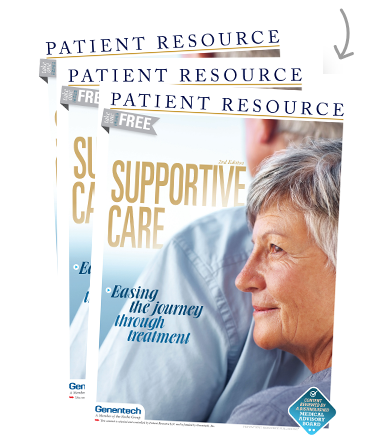Mouth Sores
Maintain good oral health
Mouth sores, or oral mucositis (myoo-koh-SY-tis), are tiny sores that begin in the mucous membrane lining in the mouth and become red, burn-like or ulcer-like. They can also affect the gums, tongue, roof of the mouth or lips, a condition called stomatitis. Mouth sores sometimes begin as mild pain or burning, followed by white patches that may become large red lesions. Pain may range from mild to severe, making it difficult to talk, eat or swallow. Also, infection may develop if bacteria enter the open sores.
What causes mouth sores?
Mouth sores can occur when mucous membranes become inflamed. The cells of the mucous membranes in the mouth divide rapidly, so they may be damaged by cancer treatments. Some drug therapies are more likely than others to cause mouth sores. The cells lining the mouth are also sensitive to radiation therapy. People who receive a bone marrow/stem cell transplant are at high risk for mouth sores because of the chemotherapy or radiation therapy that typically accompany those treatments.
When do mouth sores typically occur?
Mouth sores usually develop within a few days after treatment begins and heal within 2 to 4 weeks after it ends.
Sometimes, you can take steps to prevent mouth sores from developing or from becoming severe. Before beginning treatment, if possible, visit your dentist to help get your gums and teeth healthier. Taking good care of your teeth and gums is essential, and you should brush your teeth and floss several times a day.
If your treatment plan includes a therapy with a high likelihood of causing mouth sores, ask about intravenous medication that may be used before treatment to help prevent them. Your health care provider may recommend that you suck on ice chips during the first half-hour of your treatment. This will reduce the likelihood of mouth sores because the cold limits the amount of the drug that reaches your mouth.
How you can manage mouth sores
Managing mouth sores involves taking steps to minimize pain or discomfort and to help them heal. The following may help:
Perform oral care
- Find a dentist who is experienced in treating people with cancer, and schedule regular visits.
- Check your mouth more than once a day using a small flashlight and a mirror, and let your health care provider know if you see or feel anything different or notice taste changes.
- Brush your teeth, tongue and gums with a soft-bristled toothbrush 30 minutes after eating, every 4 hours and at bedtime.
- Avoid toothpastes that contain additional ingredients such as whiteners. Use a nonabrasive fluoride toothpaste or a solution of 1 teaspoon baking soda in 2 cups water.
- Brush your teeth gently with a soft bristle toothbrush; if using a toothbrush is painful, use a soft foam swab (available at drug stores).
- Rinse your mouth several times a day and after eating. Use a mixture of 1 tablespoon of baking soda in 1 quart of warm water, or ask your medical team to recommend a solution that may work best for you.
- Keep lips moist with unscented lip balm. Do not use petroleum jelly or other oil-based products as they may promote infection.
Avoid products that may dry or irritate the mouth
- Mouthwashes that contain alcohol.
- Glycerin swabs.
- Alcoholic beverages.
- Cigarettes, cigars, chewing tobacco and similar items.
Practice certain dietary habits
- Drink a large amount of fluids (aim for two to three quarts per day).
- Use a straw.
- Eat soft foods that are cut into small pieces and kept at room temperature or slightly warm.
- Avoid hot, spicy, greasy or fried foods; very salty or high-sugar foods; sharp or crunchy foods; citrus fruits and juices; caffeine and carbonated beverages.
Take special precautions with dentures
- Remove and clean dentures between meals regularly.
- Leave them out whenever possible to expose your gums to air.
- Wear dentures that fit properly. Loose-fitting dentures may irritate the mouth and gums. Be aware that dentures may become loose if you lose weight.
- Do not wear dentures if mouth sores are severe.
Relieve pain:
- Suck on ice chips.
- Apply topical, local anesthetic solutions or jellies, such as lidocaine.
- Use oral analgesia or intravenous analgesia with opioids as prescribed by your health care provider.
- Rinse with a medicated mouthwash prescribed by your health care provider to decrease inflammation and yeast infections.
- Use topical corticosteroids on irritated areas of the tongue, mouth or lips.

When to call your health care provider
Call when you first notice any type of sore in your mouth. A special mouth rinse, medication that coats the lining of your mouth or pain medication that can be applied topically may be options. The sooner you treat mouth sores, the easier it is to prevent them from becoming severe.
Call immediately if any of the following occurs:
- An oral temperature of 100.4 °F or higher
- Inability to take medications
- Redness or shininess in the mouth that lasts for more than 48 hours
- White patches on the tongue or inside the mouth
- Bleeding gums
- Inability to eat or drink much for 2 days. Getting the proper nutrients during and after cancer treatment is critical to promote healing and avoid dehydration and malnutrition.



